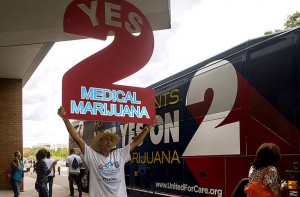 Back in November, Amendment 2, which would legalize medical marijuana, needed 60 percent of the votes in order to pass. It fell short by a mere 2 percent. United for Care, the medical marijuana group that made Amendment 2 possible, is petitioning to get Amendment 2 back on the ballot for 2016.
Back in November, Amendment 2, which would legalize medical marijuana, needed 60 percent of the votes in order to pass. It fell short by a mere 2 percent. United for Care, the medical marijuana group that made Amendment 2 possible, is petitioning to get Amendment 2 back on the ballot for 2016.
United for Care, in conjunction with advocate attorney John Morgan, announced that the secretary of state approved the new petition for consideration on the 2016 ballots.
United for Care is optimistic that the petition will pass this time, in part due to the fact that voter turnout increases in primary elections as opposed to midterm elections, and backed by the percentage of those who already support the initiative.
United for Care also has an idea of mistakes they made last time, and is eager to not make the same mistakes in preparation for the 2016 presidential election. They are also confident that legislative action or another constitutional amendment will result in the legalization of medical marijuana by 2016. United for Care hopes that this time around they will have more of an opportunity to educate voters on the particulars of the initiative, including defining what the bill will and will not do.
The main opposition Amendment 2 faced was the verbiage used in the bill. No on 2, the amendment’s opposition, argued that the language presented was too loosely defined and would result in doctor’s prescribing medical marijuana to just about anyone. While United for Care released a marketing campaign to negate these concerns, the sheer negative publicity was enough to hurt Amendment 2. United for Care will be more deliberate this time around when it comes to defining the parameters of the bill.
Parental consent will be defined more clearly, as well as adding requirements for verification by the Florida Department of Health. The new petition also clearly outlines the definition for debilitating diseases that would be covered for medical marijuana prescriptions. The new parameters also address that any malpractice will not be immune and will be treated accordingly. The Department of Health will also require the ability to conduct background checks on caregivers.
The petition needs 70,000 signatures just to be reviewed by the Supreme Court, and then another 700,000 to get on the ballot in 2016. In 2014, United for Care collected over one million signatures, so they hope to gain the same traction from supporters in preparation for the 2016 election.


